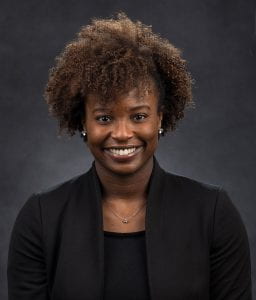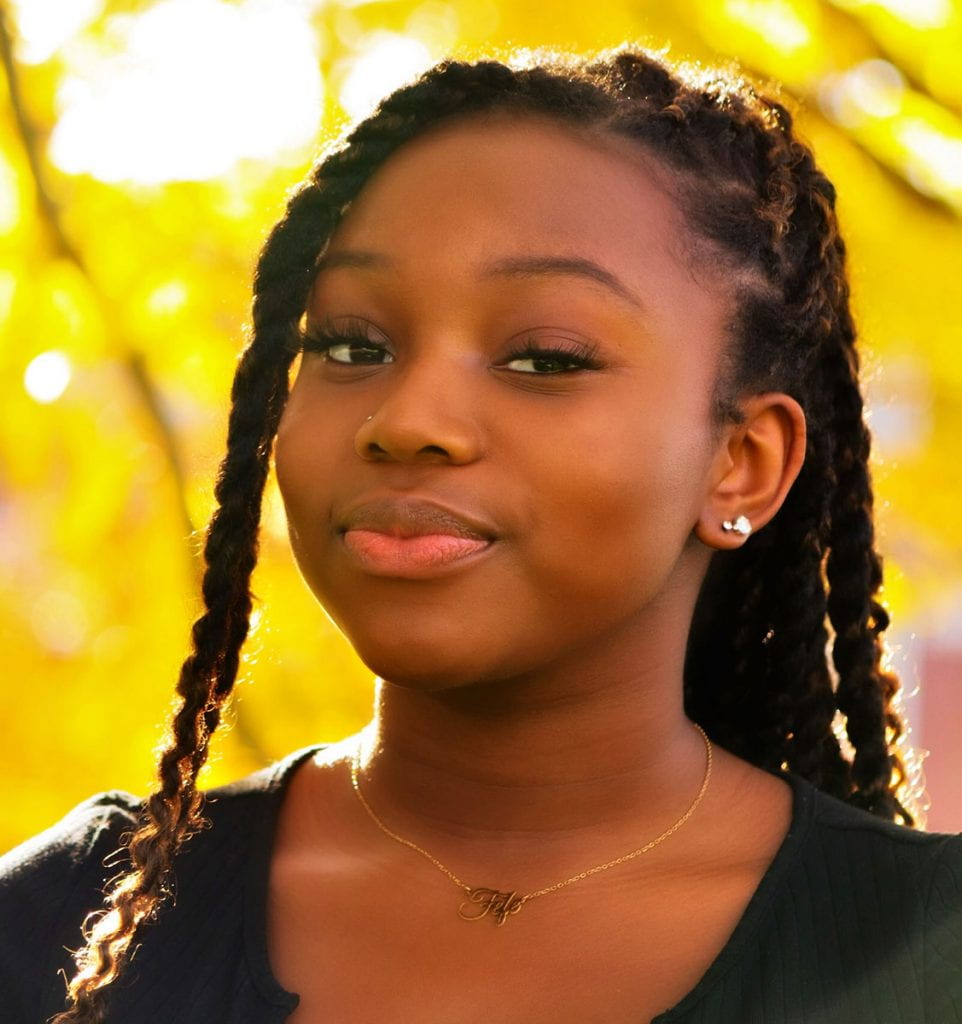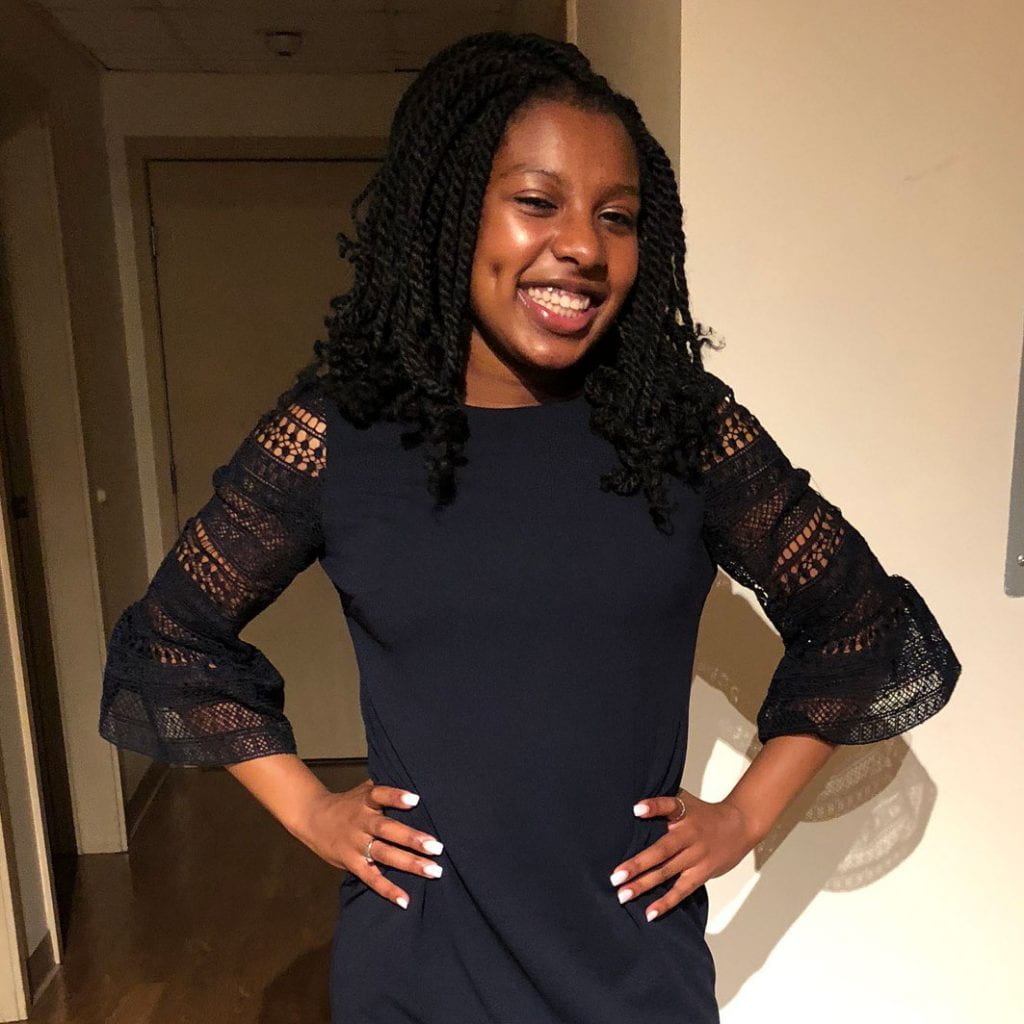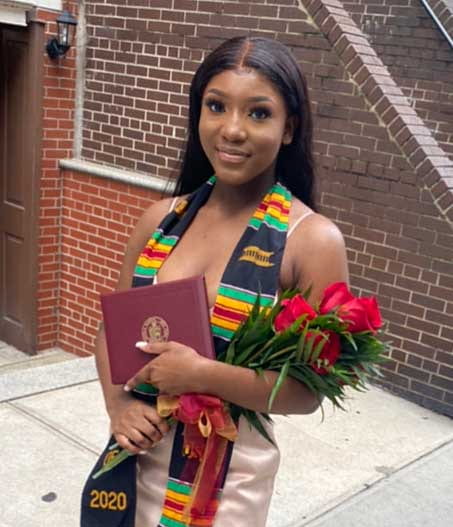Through professor’s Black Girl Magic program, students mentor middle school girls in Providence
By Vicki-Ann Downing
Once a week, four students from Providence College join a Zoom meeting to provide mentoring, encouragement, and support for a dozen sixth- and seventh-grade girls at Gilbert Stuart Middle School in Providence, helping them explore what it means to be young Black girls today.
The outreach program, called Black Girl Magic, was established by Dr. Ashley L. Smith-Purviance, assistant professor of Black studies and of public and community service studies, through a $15,000 grant from the Nellie Mae Education Foundation. Smith-Purviance, who began teaching at PC in August, created the program as a doctoral student at the University of Wisconsin-Madison, where she studied educational policy with a minor in gender and women’s studies.

“I started to notice in my research that there was no emphasis on middle school girls,” Smith-Purviance said. “For me, middle school was a huge identity period. It was a time when I began to feel there was something different about me. There were things I didn’t like about myself. I wasn’t happy with my skin color, or my hair.”
Smith-Purviance began working with fourth- and fifth-grade girls who were part of a mentoring support group at an urban middle school in Madison. Through a connection at the university, she also connected with girls at a suburban high school.
From those interactions, her Black Girl Magic program was born. She took the name from a term that was coined by writer CaShawn Thompson to highlight the beauty, power, and resilience of Black women. In the first year of Smith-Purviance’s program, students focused on conversations about conflict, racism, and stereotypes. In the second year, they worked to define Black girlhood, fostered their community, and became more grounded in their identities. They created collages, choosing photos from magazines that showed Black women and girls with natural hair and various skin tones and body types.
“My research was qualitative, but we documented the growth and development we saw in the girls through their artwork and conversations,” Smith-Purviance said. “For example, we would ask them things people say about Black girls. ‘Black girls are ugly, they’re loud, they’re ghetto.’ Stereotypes. They struggled in the beginning, googling positive words to describe themselves.”
“We stressed to them that even if you are loud, loud is OK,” Smith-Purviance said. “Love your skin color. Love your hair. In a way, they came to love themselves.”
Smith-Purviance had not planned to undertake a community outreach program so soon in her PC career. But Dr. Keith Morton, professor of public and community service studies and department chair, saw an email about the grant opportunity and encouraged her to apply.
After receiving notification of the grant award in October, Smith-Purviance connected with Nkolika Onye, principal at Gilbert Stuart, who immediately expressed interest in the program. From a pool of applicants at PC, Smith-Purviance selected four Black women and trained them as mentors. In early November, they began meeting weekly via Zoom with about a dozen girls from the middle school.
“I’ve never had a significant amount of money to support the program before,” Smith-Purviance said. “It’s great to be able to have supplies, resources, even T-shirts.”
Black Girl Magic was conceived as an after-school program with reflective writing, circle conversations, group sharing, identity-based interactive projects, film screenings, and arts and crafts to promote community building. Because of the pandemic, the program is virtual this year. The middle school participants are joining the group from their homes. It has made connecting a challenge, but conversation has progressed. There are hopes for a spring retreat, a summer program, and in-person meetings next year.
“I joined because I know how important it is to have programs like this for girls of color,” said Brittney Smith ’23 (Brockton, Mass.), a marketing major and Black studies minor. “I grew up in communities similar to the neighborhoods these girls are coming from and I can see myself in them. I want to be a reflection of who they can be and what they can accomplish.”

From 6th grade through high school, Kim Hussey ’24 (Brooklyn, N.Y.), an accountancy major, attended a mentoring program called Breakthrough New York. She understands the difference that supportive relationships can make in the lives of young girls and is eager to establish connections.
“Zoom is a different experience than in person,” Hussey said. “Some days the energy is at an all-time high and the girls are ready to share and talk about their day. Other days are quieter and we adjust. Not all of the girls know each other yet. It can be scary talking to college kids in front of other kids in your school, and we understand why they are nervous.”
Jennifer Merandisse ’24 (Worcester, Mass.) enjoyed the experience of tutoring elementary school students, many of them students of color, when she was in high school.
“Black Girl Magic is very needed down time for girls of color to have a space to talk freely about whatever good or bad is going on in their lives,” Merandisse said. “What has most impressed me is how much these girls were already so comfortable in their own skin, because when I was younger, it took me awhile to get to that point. I love being a part of this program and I can’t wait to move forward with the girls and build a deeper connection.”
Brianna Harper ’22 (Troy, N.Y.), a biology major, said she enjoys the students’ eagerness to participate and is impressed at their ability to engage through Zoom.
“I got involved because I believe it’s important to teach young Black girls the positives of being Black,” Harper said. “I love the sisterhood within the program and the focus on Black girlhood. We want to make sure they understand Black is beautiful!”
When Smith-Purviance was a doctoral student, her Black Girl Magic facilitators were adult women, in graduate school or working in careers, and through their participation, they were able to look back and reflect on their own girlhoods. Smith-Purviance hopes the college students, though younger, will benefit in the same way.
“My goal is to have this be a support for the young girls but also for the mentors, a reciprocal relationship,” she said.
Smith-Purviance grew up in Chicago and attended Catholic schools in elementary, middle, and high school. She studied business management at DePaul University, where she was active in student organizations, including the Black Student Union. DePaul, located in Chicago with a large commuter population, offered abundant resources for Black students, she said.
After graduation, she studied for a master’s degree in higher education at Syracuse University, expecting to focus on the challenges facing Black college students. But she realized issues began as early as preschool and shifted her focus.
As a Ph.D. student, she taught courses in educational policy studies and gender and women’s studies at the University of Wisconsin-Madison. She completed her doctoral dissertation in 2020. At PC, she teaches in Black Studies with a joint appointment in the Department of Public and Community Service Studies. Her research specialties are Black critical theory, Black feminism, Black girlhoods, education policy, school discipline, and community activism, organizing, and engagement.
“It is exciting to witness a brand new faculty member seek and attain external support for a new project that supports the local community — all during her first few months on the job,” said Molly Deschenes, director of corporate and foundation relations at PC, who helped secure the grant. “I am grateful to Dr. Smith-Purviance for her excellent work on the proposal. I would also like to thank Kelly Harrop, assistant director of corporate and foundation relations, for supporting the application process, and Shannon Dolan, director of placements and partnerships, for making a connection to the Gilbert Stuart Middle School.”








